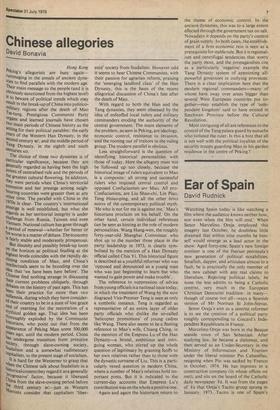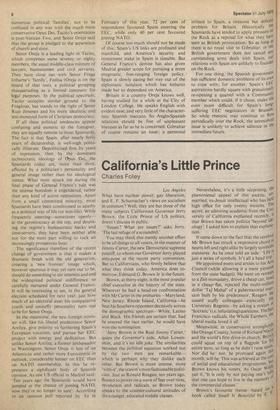Ear of Spain
David Rudnick
'Watching Spain today is like watching a film where the audience knows neither how, nor even when the film will end. When Senor Marcelino Oreja employed this imagery last October, he doubtless little dreamed that within nine months he himself would emerge as a lead actor in the show. Aged forty-one, Spain's new foreign minister is one of the Iberian peninsula's new generation of political notabilities. Smallish, dapper, and articulate almost to a fault, he is practically the only member of the new cabinet with any real claims to liberalism. Rejecting Political labels, he none the less admits to being a Catholic centrist, very much in the European Christian Democrat tradition: in many— though of course not all—ways a Spanish version of Mr Norman St John-Stevas.
Senor Oreja's aim as a centrist reformer is to see the creation of a political party roughly corresponding to Giscard's Independent Republicans in France.
Marcelino Oreja was born in the Basque seaside town of San Sebastian. After studying law, he became a diplomat, and then served as an Under-Secretary in the Ministry of Information and Tourism under the liberal minister Pio Cabanillas, resigning when Pio was sacked by Franco in October, 1974. He has interests in a construction company (in whose offices we met), and sits on the board of the Catholic daily newspaper Ya. It was from the pages of Ya that Oreja's Tacito group sprang in January, 1973. Tacito is one of Spain's numerous political 'families', not to be confused in any way with the much more conservative Opus Dei. Tacito's orientation is post-Vatican Two, and Senor Oreja said that the group is pledged to the separation of church and state.
Senor Oreja is a leading light in Tacito, which comprises some seventy or eighty members, the usual middle-class mixture of lawyers, businessmen and civil servants. They have close ties with Senor Fraga Iribame's 'family', Fedisa (Oreja is on the board of that too), a political grouping masquerading as a limited company for legal purposes. In the political spectrum, Tacito occupies similar ground to the Fragistas, but stands to the right of Senor Ruiz Jimenez and his more idealistic and less moneyed form of Christian democracy.
If all these political tendencies appear confusing and esoteric to the foreigner, they are equally remote to most Spaniards. The fact is that Spain, after nearly forty years of dictatorship, is well-nigh politically illiterate. Depoliticised first by years of repression, then by the dominant technocratic ideology of opus Dei, the Spaniards today are, more than most, affected by a politician's personality and general image rather than his ideological stance. What most struck me during the final phase of General Franco's rule was the intense boredom it engendered, rather than any kind of active opposition. Apart from a small committed minority, most Spaniards have been conditioned to apathy as a political way of life (or non-life). While frequently sneering—sometimes openly— at the gerontocracy at the top, and despising the regime's bureaucratic hacks and time-servers, they have been neither able nor for the most part willing to rock an increasingly prosperous boat.
The significance therefore of the recent change of government is that it makes a dramatic break with the old generation, creating a 'new frontier' image which, however spurious it may yet turn out to be, should do something to stir interests and end the widespread political indifference so carefully nurtured under General Franco. It will be interesting to see, in the general election scheduled for next year, just how much of an electoral asset his comparative youth and unstuffy personality turn out to be for Senor Oreja.
In the meantime, the new foreign minister will, like his liberal predecessor Senor Areilza, give priority to furthering Spain's European vocation, and pursue her EEC project with energy and dedication. But unlike Senor Areilza, a former ambassador to Washington, Senor Oreja is less of an Atlanticist and rather more Eurocentric in outlook, considerably keener on EEC than on NATO membership. In this he represents a significant body of Spanish opinion. As one US official in Madrid said: 'Ten years ago the Spaniards would have jumped at the chance of joining NATO, now they're no longer so sure'. According to an opinion poll reported by Ya in February of this year, 72 per cent of respondents favoured Spain entering the EEC, while only 40 per cent favoured joining NATO.
Of course too much should not be made of this; Spain's US links are profound and manifold, and America's security and investment stake in Spain is sizeable. But General Franco's demise has also given Madrid greater scope for pursuing a more pragmatic, free-ranging foreign policy. Spain is slowly easing her way out of the diplomatic isolation which has hitherto made her so dependent on America.
Britain is a country Oreja knows well, having studied for a while at the City of London College. He speaks English with evident ease, and very. little of the characteristic Spanish staccato. So Anglo-Spanish relations should be free of unpleasant hiatuses as far as he is concerned. Gibraltar of course remains an issue; a perennial irritant to Spain, a tiresome but delicate problem for Britain. Historically the Spaniards have tended to apply pressure on the Rock as a reprisal for what they have seen as British provocation. So as long as there is no royal visit to Gibraltar, or the British government does not cancel anY outstanding arms deals with Spain, our relations with Spain are unlikely to founder on the Rock.
For one thing, the Spanish government has sufficient domestic problems of its own to cope with; for another, Spain's EEC aspirations hardly square with gratuitouslY re-opening a quarrel with, a Community member which could, if it chose, make life even more difficult for Spain's long' suffering EEC negotiators in Brussels. So while rhetoric may continue to flow, periodically over the Rock, the unresolved issue is unlikely to achieve salience in the immediate future.



































 Previous page
Previous page